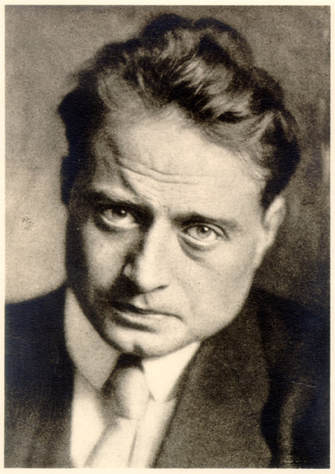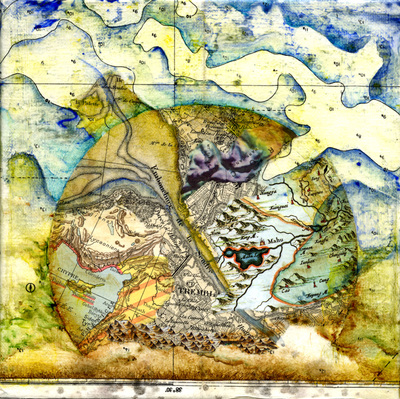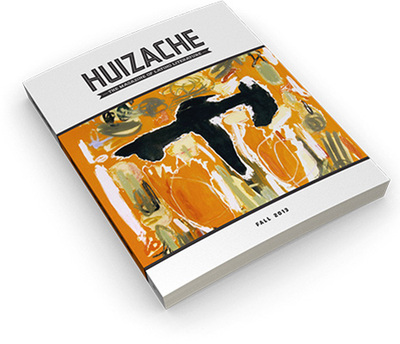Artistes
Expressionist poems of adolescence in pre-World War I Prague by Franz Werfel
To a Chansonette (Th. D.)
In your resolve to go on we saw you! But tell us what miracle made you go? The stage was you, the waltz was you as well, And all found his fate and what befalls him In your funny song. But you stood alone, With your curtsy, your singing, and repose. What did you know about yourself and us? In your resolve to go on we saw you! Raise your eyes up to the ceiling, or draw The words out long and let your knees quiver! You will never, never see your poet. But it shall happen one day in hours of tears, That your presence, as it lies eternal, Envelops my lips like a fold in me. Concert by a Piano TeacherAlready the fat lady with the freckles,
Which dare to plunge deep into her décolletage —I wish a blouse for her and a stiff collar— Sits at the piano, plump and spilling out. Soon her notes lead a pompe funèbre's horses. Chopin, the Funeral March... and far to solemn... I feel nothing but empty disappointment, Annoyed at this woman's heavy-handedness. Schoolgirls are sitting around in a circle, And they act rapt, while hating her in silence. Ten baskets of roses glow, like soft torches Making things light up lovely from the background, And they shimmer from the horrified pupils At her breasts jiggling with every cadence. Still You Dance Bronislava A rapturous fair sky over this spot!
You know the golden flags of seaside resorts, You know of princes, And the blowing of autumn's death-haloo! You schoolboy trees Shrug with your shoulders The last net, the brown one! Casts its shadow over me— Here I sit And read that vivacious Name on the stone. Now you are with my grandmother, child. O that party under the earth, Which no one wants to think about! You died. And was a doctor in the room, Did his little bottles plink in their going around, Did a mother scream, or Did you cough alone? Didn't doors slam in the hallway, Did a housewife call out for some sugar, And below did the old horses trot onward? Where I sat there and said: Still you dance Bronislava. Come now, come here you my waltz! To the hill, you genius for funny little songs, You adoring voices every night, And from the piano That spirit of your lilting contralto! Are you serious with me beneath the cypresses? And you no longer say (O voice immaculate And yet drunk): "Pardon me, sir, Who do you think you are?" A wall runs with the streets And encircles your narrow garden. Outside people stand and wait. Boys with gusting kites And girls watching the little ones. And before the gate This immortal old man sells that old Stick candy of childhood SylviaCarried aloft by the cakewalk of the music,
She floats away artlessly toward the soffits, And does not know—o morals dear and modest— That the lightning is wrapping cloaks around her. Her troupe dare not take their eyes away from her And throng from left and right... She floats in their midst, The many upraised hands implore; she stops. Already everything is whirling, limbs race. In no time the pyramids stand on both sides. Above two little boys have wildly begun, Cartwheeling parallel to their brothers' soles, So like fireworks in the spa park's ceasefire, Radiantly cold suns around a centerpiece, Which spin careening and in spinning burn out. |
Einer Chansonette (Th. D.)
In dir beschlossen sahen wir dich gehn! Doch sprich, mit welchem Wunder ging es zu? Die Buhn war du, der Walzer auch war du, Und alles fand sein Schicksal und Geschehn Um dein Couplet. Doch einsam war dein Stehn, Allein dein Knix, dein Singen und die Ruh Des Leibs. Von dir und uns was wußtest du? In dir beschlossen sahen wir dich gehn! Heb auf zur Deck die Augen, oder zieh Die Worte lang und bebe mit dem Knie! Du wirst es nie, dein Dichter nie verstehn. Doch soll s in Tränenstunden einst geschehn, Daß sich dein Wesen, wie s im Ewigen liegt, Als Falte mir um meine Lippe schmiegt. Note: dedication, Th. D., i.e., Thea Degen (b. 1891), a German singer and dancer who performed at Prague's Cabaret Lucerna between 1910–12. Franz Kafka was less impressed by her, at least for one performance, writing in his diary: "The Degen's stupid dance, with flying will-o'-wisps, twigs, butterflies, death's heads." Line 3, waltz (Walzer), while the Viennese ballroom dance is often borrowed with the loan word, it can mean wilder stage variations, like the Hezentanz (witches dance) referred to by Kafka.
Konzert einer KlavierlehrerinDie dicke Dame mit den Sommersprossen,
Die tief sich in die Dekolletage wagen —Ich wünsche Bluse ihr und steifen Kragen—, Sitzt schon am Flügel, fett und hingegossen. Die Noten ziehn gleich Pompefunèbre-Rossen. Chopin, der Trauermarsch... und so getragen... Ich fühle nur ein leeres Mißbehagen, Von dieses Weibes Übermaß verdrossen. Die Schülerinnen sitzen in der Runde Und tun entzückt und hassen sie im stillen. Zehn Rosenkörbe glühn wie milde Fackeln Aufleuchtend lieblich aus dem Hintergrunde, Und schauen aus geängstigten Pupillen Auf ihre Brüste, die im Takte wackeln. Noch tanzet Bronislawa Entrückter leichter Himmel über dem Ort!
Du weißt von der Seebäder goldenen Fetzen, Du weißt von Prinzen, Und herbstlichem Halali! Ihr Knabenbäume Zuckt von den Schultern Das letzte Netz, das braune! Den Schatten werfet auf mich, - Hier sitze ich Und lese den übermütigen Namen im Stein. Nun bist du bei meiner Großmutter, Kind. O unterirdisches Fest, Das niemand denken will! Du starbst. Und war ein Arzt im Zimmer, Klirrten die Fläschchen im Kreis, Schrie eine Mutter, oder Hast du allein gehustet? Schlugen die Türen am Gang' nicht, Rief eine Hausfrau um Zucker, Und trabten unten Weiter die alten Pferde? Wo saß ich da und sagte: Noch tanzet Bronislawa. Nun komm, nun komm du mein Walzer her! Zum Hügel, du Genius kleinen Couplets, Ihr nächtlich anbetenden Stimmen, Und vom Klavier Geist des schwankenden Alten! Bist du mir ernst unter den Zypressen? Und sagst nicht mehr (O Stimme unberührt Und doch betrunken): »Pardon, mein Herr, Wie kommen Sie mir vor?« Um deinen engen Garten Läuft eine Straßenmauer rund. Draußen stehen Menschen und warten. Buben mit stürmischen Drachen Und Mädchen, die Kleine bewachen. Und vor dem Tor Verkauft der unsterbliche Greis die alten Zuckerstangen der Kindheit. Note: title, Bronislava (Bronislawa), is not Nijinska, but a barmaid, dancer, and chanteuse who worked at the Cabaret Lucerna. A brief eulogy to her is included in the play Die Versuchung (The Temptation), a dramatic dialogue between a poet, an Archangel, and Lucifer:
Bronislava, you dance with some skinny idiot. And I wither in pain and joy, for soon, soon your wonderful, tender body will be redeemed. You are no more. No longer do you plunge downward with the waltz of the all-women orchestra, with the smell of wine, with the dilatory attention of the waiter. A casket contains your silver skeleton. But your immortal eyes, the hard dance step of your foot, your fluttering contralto, your nonsensical expressions, all of this, all of this floats away and is everywhere, and I am the lucky man who finds it when the moon rises and girls crank their buckets up from the well. Line 26, funny little songs (Couplets), i.e., a type of French-style cabaret song that formed a "couplet" with its refrain. SylviaVom Cakewalk der Musik emporgetragen
Entschwebt sie unschuldsreich zu den Soffitten, Und weiß nicht—o bescheidne, liebe Sitten—, Daß Lichteffekte Mäntel um sie schlagen. Die Truppe darf den Blick nicht von ihr wagen. Und links und rechts gedrängt... Sie schwebt inmitten, Die vielen aufgehobnen Hände bitten; Sie hält. Schon wirbelt alles, Glieder jagen. Im Nu stehn beiderseits die Pyramiden. Zwei Knirpse haben oben toll begonnen, Sie kreisen waagrecht auf der Brüder Sohlen, So wie beim Feuerwerk im Kurparkfrieden Ums Mittelstück die strahlenkalten Sonnen Sich rasend drehn und noch im Drehn verkohlen. Note: line 1, Cakewalk, the African-American dance was a popular ballroom dance in Germany during the early 1900s; line 2, soffits, plywood or fabric drapes or scenery (such as clouds) used to hide the lights. The poem describes an extravagant and mildly erotic performance for the stage of a European summer resort incorporating dancers, acrobats, and even, perhaps, human pyramids. Such numbers were intended to cater to male fantasies. In this sonnet’s closure, however, there is the counterpoint of a kind of ultimate erotic disappointment.
|
Copyright © March 2018 Map Literary and James Reidel
|
Photo caption: Franz Werfel, about 1912. Credit: Mahler-Werfel Papers, Kislak Center for Special Collections, Rare Books and Manuscripts, University of Pennsylvania.
|
Franz Werfel was born in Prague in 1890 of the same milieu as his friend and contemporary Franz Kafka. Werfel enjoyed much success as a poet in Austria and Germany in the years before and during World War I. As the companion of Gustave Mahler’s widow, Alma Mahler, Werfel’s reputation eventually came to rest on his plays and fiction, including The Forty Days of Musa Dagh (1933) and The Song of Bernadette (1942), which won him much international recognition. Such novels, however, stand in contrast to Werfel’s poetry, especially his earlier Expressionist verse, which is largely unknown now and little translated. Werfel died in exile in Beverly Hills in 1945.
JAMES REIDEL has published poems in many journals as well as Jim’s Book (Black Lawrence Press 2014) and My Window Seat for Arlena Twigg (Black Lawrence 2006). His most recent work appears in Poetry, Queen Mob’s Teahouse, Hawai’i Review, Outsider, Fiction Southwest, The Flexible Persona, and elsewhere—including The Best Small Fictions 2016. He is also the biographer of the poet Weldon Kees and a translator who has published works by Thomas Bernhard, Georg Trakl, Robert Walser, and others. He is currently writing a collection of prose poems. In 2013, he was a James Merrill House fellow.
|










